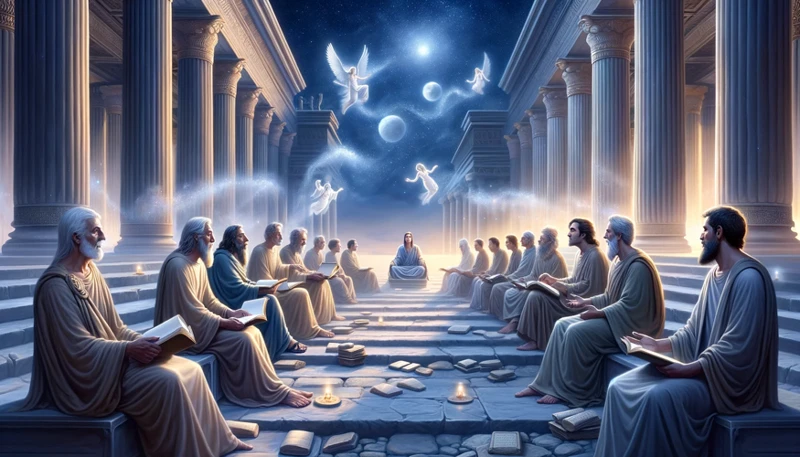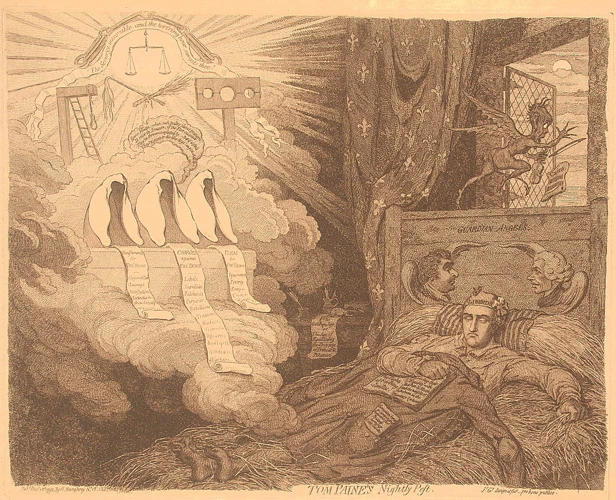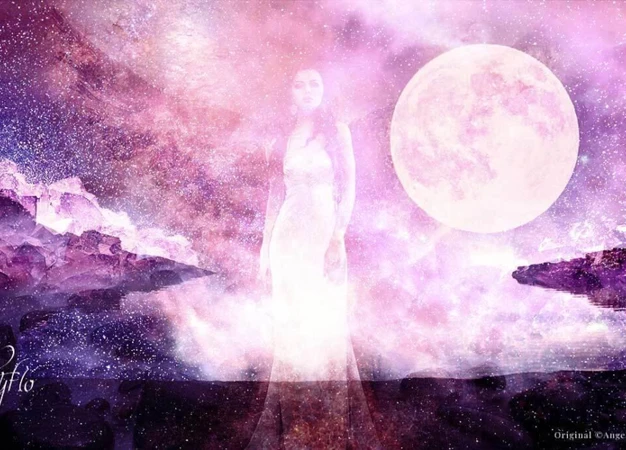Have you ever had a dream about the rapture? The surreal and apocalyptic imagery of the rapture can leave a lasting impact on our subconscious mind. In this article, we will delve into the symbolic interpretations of the rapture in your dreams, exploring the possible meanings behind this intriguing phenomenon. By examining psychological interpretations, cultural and religious contexts, personal and symbolic meanings, as well as common variations and related dream symbols, we hope to decode the enigma of the rapture dream. Join us on this journey of exploration and self-discovery as we uncover the hidden messages that may lie within your dreams.
The Rapture: A Brief Overview

The concept of the rapture holds significant meaning in various religious beliefs, particularly in Christianity. It refers to an event where believers are taken up to heaven, leaving non-believers behind on Earth. The origin of the term “rapture” can be traced back to the Latin word “rapere,” meaning “to be caught up” or “snatched away.” The idea of the rapture gained prominence in the early 19th century through the teachings of theologians like John Nelson Darby. It is often associated with the Second Coming of Christ and the apocalyptic event described in the Book of Revelation. The rapture is widely debated among different Christian denominations, with varying interpretations of its timing and nature. Some see it as a literal event that will occur before a period of tribulation, while others view it as a symbolic representation of spiritual awakening and transformation. The concept of the rapture carries profound significance and has fueled endless theological discussions. (For more information about dreams and their biblical interpretations, you can check out our article on “What Do Rats Mean in a Dream Biblically?“)
Psychological Interpretations of Dreams

Psychological interpretations offer valuable insights into understanding the rapture dream and its symbolic meanings. Dreams are often seen as reflections of our subconscious mind, representing our fears, desires, and inner conflicts. When it comes to the rapture dream, several psychological explanations can shed light on its significance. Firstly, the dream may be an expression of unconscious fears and anxieties, reflecting feelings of vulnerability or the fear of being left behind. Secondly, the rapture can be interpreted as a symbol of spiritual awakening and transformation, representing personal growth and a shift in beliefs or values. Additionally, the dream may tap into a fear of the unknown and the loss of control, highlighting our innate need for security and certainty in life. Lastly, the rapture dream could serve as a symbolic representation of change, signifying the end of one phase or chapter and the beginning of another. Exploring these psychological interpretations can deepen our understanding of the rapture dream and its underlying meanings. (For more information about dreams and their biblical interpretations, you can check out our article on “What Does It Mean When You Dream Your Teeth Are Falling Out Biblically?“)
1. Unconscious Fears and Anxiety
One possible interpretation of dreaming about the rapture is that it represents unconscious fears and anxiety. Dreams often serve as a way for our subconscious mind to process and express underlying emotions and concerns. The rapture, with its dramatic and cataclysmic imagery, can symbolize a deep-seated fear of the unknown or apocalyptic events. It may reflect anxieties about personal or global crises, feelings of powerlessness, or concerns about the future. Such dreams might be triggered by real-life stresses or external factors that evoke feelings of uncertainty and insecurity. When interpreting a dream about the rapture, it is essential to consider the individual’s unique fears and anxieties. (For more insights into biblical dream interpretations, you can explore our article on “What Does Losing Teeth in a Dream Mean Biblically?“)
2. Spiritual Awakening and Transformation
In the realm of dream symbolism, the concept of the rapture can represent a profound spiritual awakening and transformation. Dreams featuring the rapture may serve as a metaphorical expression of an individual’s inner journey towards enlightenment and personal growth. The imagery of ascending to the heavens can signify a desire for transcendence and spiritual elevation. It may suggest a deep longing for a closer connection with a higher power or a sense of purpose in one’s life. The dream may be an invitation to explore and embrace one’s spiritual path, letting go of old patterns and beliefs that no longer serve them. The rapture dream can serve as a powerful reminder to focus on inner transformation and embark on a journey towards higher consciousness. It encourages individuals to examine their spiritual beliefs, seek deeper meaning in life, and align their actions with their inner values and truths. Embracing spiritual awakening and transformation can lead to a more fulfilled and purposeful existence.
3. Fear of the Unknown and Loss of Control
One of the psychological interpretations of the rapture dream is related to the fear of the unknown and the loss of control. Dreams often tap into our deepest fears and anxieties, and the idea of being suddenly taken away or left behind can evoke feelings of uncertainty and powerlessness. The rapture dream may symbolize a general apprehension about the future or a specific fear of change and the inability to cope with unexpected events. It reflects our inherent need for stability and security, and the dream may serve as a way for our subconscious mind to process and confront these fears. In essence, the rapture dream reveals our underlying concerns about what lies ahead and our desire to regain a sense of control in the face of uncertainty.
4. Symbolic Representation of Change
In the context of the rapture dream, the symbolic representation of change is a common interpretation. The rapture itself embodies a significant and transformative event, indicating a shift or transition in one’s life. It may signify the need for personal growth, letting go of old patterns, and embracing new beginnings. The imagery of believers being “caught up” or “snatched away” reflects the idea of leaving behind the familiar and entering into the unknown. This dream may serve as a metaphorical representation of the dreamer’s desire for change or their subconscious recognition of a need for transformation in their waking life. It prompts self-reflection and encourages individuals to embrace and navigate the changes that lie ahead. The symbolism of change in the rapture dream can be a powerful message, urging us to embrace the opportunities for growth and evolution that life presents.
The Rapture in Cultural and Religious Contexts

The concept of the rapture is not limited to Christianity alone but can also be found in various other cultural and religious contexts. While Christianity predominantly associates the rapture with the Second Coming of Christ, other religious traditions have their own interpretations of similar events. In Islamic eschatology, for example, there is the belief in Al-Qiyamah, the Day of Resurrection, where the righteous will be raised to a new life. Hinduism also has its concept of Moksha, which can be seen as a form of liberation and transcendence. Even outside of religious contexts, the idea of a transformative event or spiritual awakening can be found in mythology and folklore throughout different cultures. Though the specifics and interpretations may vary, these cultural and religious perspectives provide a rich tapestry of beliefs surrounding the concept of the rapture.
1. Christianity and the Rapture Event
In Christianity, the belief in the rapture event is deeply rooted in the interpretation of biblical prophecies. The concept is mainly associated with the teachings of the Apostle Paul, particularly in his letters to the Thessalonians. According to this belief, at the appointed time, faithful followers of Christ will be caught up in the air to meet Him. This event is commonly referred to as the “pre-tribulation rapture,” suggesting that believers will be taken to heaven before a period of great tribulation occurs on Earth. However, it’s important to note that not all Christians interpret the rapture in the same way. There are different viewpoints within Christianity, such as the pre-tribulation, mid-tribulation, and post-tribulation rapture theories. The idea of the rapture has sparked debates and discussions among theologians and believers alike, shaping various interpretations of eschatology. Despite the differing perspectives, the belief in the rapture event remains a significant aspect of Christian faith and holds profound implications for believers’ understanding of salvation and the end times.
2. Other Religious and Mythological Perspectives
The concept of the rapture and similar events where believers are taken to a higher realm is not exclusive to Christianity. Various other religious and mythological traditions also have similar perspectives. In Norse mythology, the event known as “Ragnarok” signifies a catastrophic end followed by a renewal of the world. Similarly, some Native American tribes believe in the Great Spirit lifting chosen individuals to safety before a great flood or disaster. In Hinduism, there is the concept of “Moksha” which represents liberation from the cycle of birth and death, akin to transcending to a higher realm. Additionally, the ancient Greeks had the notion of the “Ascent of the Soul” where the soul strives to reach a state of purity and enlightenment. These diverse religious and mythological perspectives offer intriguing parallels to the concept of the rapture, highlighting the universal human fascination with transcendence and divine intervention.
Personal and Symbolic Meanings Behind the Rapture Dream

The rapture dream holds personal and symbolic meanings that can vary from individual to individual. Here are some possible interpretations and insights into the significance of the rapture dream:
1. Symbolism of Ascension and Transcendence: The rapture dream may symbolize a desire for spiritual growth and elevation. It could represent a longing for transcendence and a deeper connection with the divine.
2. Reflections on Faith and Beliefs: This dream can prompt introspection regarding one’s faith and beliefs. It may signify questioning or reaffirming religious or spiritual convictions, inviting individuals to explore their relationship with higher powers.
3. Perceptions of Judgment and Salvation: The rapture dream can evoke thoughts of judgment and salvation. It might reflect feelings of guilt, uncertainty, or the need for redemption. It can also be a reminder to focus on leading a righteous and purposeful life.
4. Significance of Endings and Beginnings: The dream of the rapture could symbolize the end of a chapter or phase in life. It may indicate an upcoming transition or a call for embracing new beginnings and opportunities.
The personal and symbolic meanings behind the rapture dream can be deeply connected to an individual’s beliefs, experiences, and subconscious mind. It is important to consider personal context and emotions while interpreting such dreams.
1. Symbolism of Ascension and Transcendence
Symbolism of ascension and transcendence is a key aspect of the rapture dream. In these dreams, the act of being lifted up into the heavens represents a journey to a higher spiritual plane. It symbolizes personal growth, enlightenment, and the pursuit of a deeper understanding of oneself and the world. The dream may be suggesting a need for personal transformation or a desire to break free from limitations. Ascension in the rapture dream is often accompanied by a sense of liberation and divine connection. It signifies a longing for transcendence and an elevation of consciousness beyond the earthly realm. This symbolism of ascension and transcendence invites individuals to explore their spiritual path and strive for inner transformation.
2. Reflections on Faith and Beliefs
Within the context of the rapture dream, it is common for individuals to experience reflections on their faith and beliefs. Dreams have a way of tapping into our deepest thoughts and emotions, and the imagery of the rapture can symbolize our inner conflicts and doubts regarding our spiritual convictions. This dream may serve as a catalyst for introspection, prompting us to question our belief systems and examine the strength of our convictions. It can also be a reminder to reconnect with our faith and nurture our spiritual well-being. The rapture dream invites us to explore the core of our beliefs and reassess the role they play in our lives. It may encourage us to seek a deeper understanding of our faith and strengthen our connection with a higher power. Ultimately, the reflections on faith and beliefs that arise from the rapture dream can lead to personal growth and a reaffirmation of our spiritual journey.
3. Perceptions of Judgment and Salvation
In dreams featuring the rapture, one possible interpretation revolves around perceptions of judgment and salvation. The rapture is often associated with divine judgment, where the righteous are saved and the wicked are left behind to face the consequences. This symbolic representation in dreams may reflect an individual’s fears or anxieties about being judged or feeling unworthy. The dream may serve as a mirror to examine one’s actions, beliefs, and moral compass. It can evoke feelings of introspection, prompting individuals to evaluate their choices and strive for spiritual growth and redemption. The concept of salvation is deeply rooted in religious teachings, and dreams about the rapture may evoke powerful emotions tied to the desire for forgiveness, grace, and the hope of eternal life. Such dreams can encourage individuals to seek a deeper understanding of their spiritual journey and the path towards personal salvation.
4. Significance of Endings and Beginnings
Dreams about the rapture often carry a profound symbolic meaning related to endings and beginnings in our lives. The imagery of the rapture can represent a transformative phase or a transition from one chapter to another. Just as the rapture signifies the end of the world as we know it, it can also symbolize the end of a particular phase or situation in our waking life. This dream may indicate that we are on the brink of a major change or transition, whether it be in our relationships, career, or personal growth. It encourages us to embrace the opportunity for a fresh start, letting go of what no longer serves us and opening ourselves to new beginnings. The rapture dream serves as a reminder that even though endings can be daunting, they ultimately pave the way for new and exciting possibilities in our journey of self-discovery and spiritual growth.
Common Variations and Related Dream Symbols
When it comes to dreams about the rapture, there are several common variations and related symbols that may appear. These symbols can offer additional insight into the meaning behind the dream. One common variation is the presence of unfolding cataclysmic events, such as natural disasters or the world descending into chaos. These events often represent feelings of impending change or upheaval in one’s life. Crowds and people gatherings are another frequent symbol observed in rapture dreams. These gatherings may symbolize the collective sense of community, judgment, or the coming together of individuals during significant events. Other related symbols that may appear include bright lights, heavenly gates, or angelic beings. Each of these symbols adds layers of meaning and can help decipher the deeper message within the dream.
1. Unfolding Cataclysmic Events
In rapture dreams, one common variation involves witnessing unfolding cataclysmic events. These dreams often depict apocalyptic scenarios, such as earthquakes, floods, or meteor showers. These catastrophic events symbolize a sense of turmoil or upheaval in one’s life. They may represent the challenges and obstacles that you are currently facing, or they could indicate a fear of impending change and uncertainty. It is important to pay attention to the specific elements and emotions associated with these cataclysmic events in your dream, as they can provide valuable insights into your subconscious fears and anxieties. By decoding the symbolism behind these events, you may gain a deeper understanding of the underlying messages and concerns that your subconscious mind is trying to communicate.
2. Crowds and People Gatherings
Crowds and people gatherings are common symbols that can appear in rapture dreams. These symbols often represent the collective human experience and the sense of community. In the context of rapture dreams, crowds can signify the division between believers and non-believers. The presence of a large gathering may suggest the impending separation of those who will be taken up in the rapture and those who will be left behind. The emotions associated with crowds in these dreams can vary from excitement and anticipation to fear and uncertainty. It is important to consider the specific details and emotions within the dream to gain a deeper understanding of the symbolic meaning behind the crowds and people gatherings.
Conclusion
In conclusion, exploring the symbolic interpretations of the rapture in our dreams can provide valuable insights into our subconscious mind. The rapture dream can be understood through psychological interpretations, cultural and religious contexts, as well as personal and symbolic meanings. It may symbolize fears, spiritual awakening, or a reflection of our beliefs and perceptions of judgment and salvation. The rapture dream often signifies change and the transition from one phase to another. We have also discussed common variations and related dream symbols that may accompany the rapture dream, such as unfolding cataclysmic events or crowds and people gatherings. By decoding the hidden messages in our dreams, we can gain a deeper understanding of ourselves and the world around us. So, the next time you have a dream about the rapture, remember to delve into the rich symbolism and meanings it may hold.
Frequently Asked Questions
1. Can everyone have a dream about the rapture?
Yes, dreams about the rapture are not limited to individuals of a specific religious background. Dreams are a natural part of human experience, and the imagery of the rapture can manifest in the dreams of people from various belief systems.
2. What does it mean if I dream about the rapture even if I’m not religious?
Dreams are highly subjective and deeply personal experiences. If you dream about the rapture despite not being religious, it could be interpreted as a symbol of significant change or transformation in your life, unrelated to religious beliefs.
3. Are rapture dreams always apocalyptic and terrifying?
No, not all rapture dreams are terrifying or apocalyptic in nature. Dream experiences can vary greatly, and the emotions and imagery associated with a rapture dream can range from fear and anxiety to feelings of peace and transcendence.
4. Is there a specific meaning or message behind rapture dreams?
The meaning of rapture dreams can differ for each individual. It is essential to consider your personal experiences, beliefs, and emotions in order to interpret the specific message or meaning behind your dream.
5. Can rapture dreams be prophetic or predictive of future events?
While some individuals may believe that their dreams hold prophetic significance, the scientific community generally considers dreams as reflections of one’s thoughts, emotions, and experiences rather than foresight into future events.
6. How can I interpret the symbolism in my rapture dream?
Interpreting the symbolism in a rapture dream requires self-reflection and exploration of your personal associations and emotions connected to the imagery. Keeping a dream journal and seeking professional guidance, such as from a therapist or dream analyst, can also assist in unlocking the symbolism.
7. Can rapture dreams have different meanings for different people?
Yes, dreams are subjective experiences, and the meanings attached to them can vary greatly from person to person. Factors such as cultural background, personal beliefs, and individual experiences all contribute to the unique interpretation of a rapture dream for each individual.
8. Are rapture dreams related to religion only?
While the concept of the rapture is predominantly associated with religious beliefs, rapture dreams can also hold symbolic meanings independent of religious contexts. These dreams can represent personal transformations, fears, or desires for change and transcendence.
9. Can rapture dreams have positive interpretations?
Absolutely! Rapture dreams can have positive interpretations, reflecting personal growth, spiritual awakening, or a sense of liberation from past struggles. The emotional tone and individual experience of the dream play a significant role in interpreting its overall meaning.
10. Are there any cultural or historical references to the rapture besides Christianity?
Yes, while the Christian concept of the rapture is well-known, similar themes of divine intervention, ascension, or cataclysmic events can be found in various other religious and mythological traditions. Examples include the Norse concept of Ragnarok and the Hindu belief in Kalki’s arrival.






